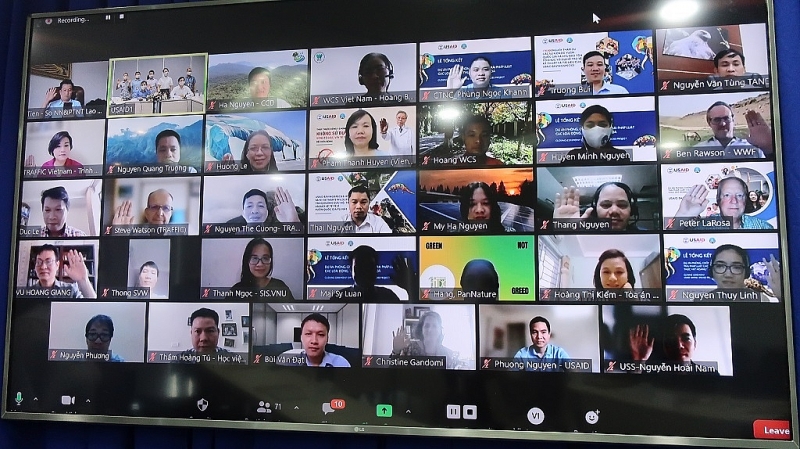
U.S supported project strengthens Viet Nam’s efforts to protect wildlife
Latest
 |
| Participants at the event. (Photo: USAID) |
The virtual event was attended by delegates from ministries, state agencies, business associations, social organizations, and international organizations united in their efforts to protect Viet Nam’s wildlife.
Over the past five years (2016-2021), the USAID Saving Species has effectively supported the Government of Viet Nam to improve and harmonize the legal system related to wildlife protection, strengthen law enforcement and prosecution of wildlife crimes, and reduce demand and illegal consumption of wildlife.
“USAID is proud to support Viet Nam to reduce consumer demand for illegal wildlife products, build wildlife law enforcement and prosecution capacity, as well as augment and harmonize the legal framework for combating wildlife crime in Viet Nam.
We are very pleased to see that the cooperation between the two countries through this project has brought meaningful results. Viet Nam is a critical partner of the United States for countering wildlife trafficking", said USAID/Vietnam Mission Director Ann Marie Yastishock at the event.
Associate Professor, Dr. Le Quoc Doanh, Deputy Minister, MARD, emphasized: “The joint effort of USAID and Vietnamese government through USAID Saving Species project has contributed significantly to protect wildlife species and maintaining important eco-services to the national and regional sustainable socio-economic development”.
The USAID Saving Species project has supported the development, amendment and adoption of four important legal documents that are key to ensuring consistent management and protection of wildlife in Viet Nam, resolving legal gaps and overlapping regulations.
USAID Saving Species also trained more than 2,600 officials from agencies including forestry protection departments, customs officials, environmental police, wet market managers, border guards, courts, and prosecutors to help them more effectively tackle wildlife crimes. Prosecution rates for wildlife violation arrests have increased from 25% in 2018 to 75% in August 2021.
In coordination with the CITES Management Authority of Viet Nam, the project ran three large social behavior change communication campaigns that raised public awareness about wildlife protection legislation, targeting consumers of ivory, rhino horn and pangolin products, and encouraged traditional medicine practitioners to reduce their use of wildlife for health treatments.
These campaigns reached tens of millions of people with messages about protecting wildlife and reducing the demand for wildlife products and resulted in millions of online interactions, with significant results.
A recent consumer impact survey indicated that recipients of the Saving Species communications campaign messages are less likely to buy ivory, rhino horn, and pangolin products than they were prior to the campaign.
Among high income earners, the percentage of buyers of ivory decreased from 16% in 2018 to 9% in 2021; and the percentage of buyers of rhino and pangolin products decreased from 8% in 2018 to 6% in 2021.
The USAID Saving Species project benefitted from its partnerships with the MARD and CITES Management Authority of Viet Nam. Through subsequent projects, USAID will continue to support effective protection of wildlife and the strengthened cooperation of the two countries in wildlife crime prevention and control.





















